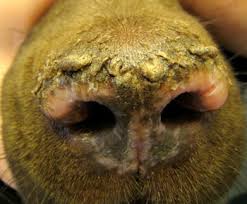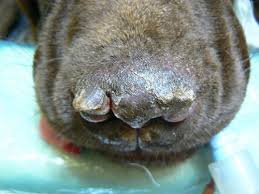HNPK in Labradors-A genetic issue that is unsightly and very unpleasant for your LAB
Hereditary Nasal Parakeratosis (HNPK)
For: Labrador Retrievers; Lab/Golden Crosses; Labradoodles & Labradoodle, Australians
If you’ve never seen this condition before, it is quite startling. I never saw it until a dog I bought from a breeder friend (outside my breeding lines) started showing signs. His nose was constantly crusty with large, raised bumps. We didn’t breed him as soon as we saw it, as we suspected HNPK. Its gotten progressively worse, and we have not found anything to help cure it. We’ve since neutered him and he is a pet and will be loved by us, despite this genetic defect. The breeder has been notified and has taken any dogs that are “carriers” out of her program, thank goodness. We’ve begun screening all of our breeding stock as well. We have not come up with a carrier yet, but if we do, it is necessary to never breed that to another carrier, therefore producing “affected” offspring.
There is not treatment and no cure.
As show breeders have continued to breed for the ‘ever-coveted’ big ribbon, they choose to ignore VERY important health clearances that will affect the dogs they place as pets and also continue to spread this issue more and more into the labrador population. Its one of the many pet peeves I have with show breeders. They claim “I don’t breed for pets, so I don’t need to do ________ health clearance”…and on an on with excuses as to why they don’t need to clear their breeding stock for things like HNPK and EIC, etc. But after selecting their show picks from their litters–guess where the rest go? As PETS!
Responsible breeders are now clearing for this. If you don’t see it on their website, ASK!!!
Because puppy mills and backyard breeders, and breeders of labradoodles and lab mixes don’t generally spend the money for expensive health clearances like HNPK, you will most likely find your dog carrying this grotesque disease. If the breeder is not clearing for it, don’t get a pup from them! And don’t buy one claiming you’ve “rescued” it! This is the one thing people do that just causes puppy mills to proliferate…the puppy miller sold all his pups…so he proceeds to breed again…and it goes on and on.
OptiGen is pleased to offer the Hereditary Nasal Parakeratosis (HNPK) test (patent pending EP2666871A1, US20130316345) through licensing with LABOKLIN Laboratories. HNPK is an inherited skin disorder observed in Labrador Retrievers. The first symptoms of hyperparakeratosis appear at the age of six months to one year of age and present as crusty scales on the nose pad. Occasionally painful fissures may also occur, leading to chronic irritation and inflammation of nasal skin. Although the disease is not life-threatening, it is persistent and requires continuous application of moisturizing agents and antibiotics to the afflicted dog’s nose to alleviate symptoms.
HNPK is inherited as a monogenic autosomal recessive trait, meaning that in order for the disease to occur an offspring must inherit two copies of the mutation– one from each parent. A single nucleotide mutation in the SUV39H2 gene has been identified as the causative genetic defect for HNPK in this breed by Jagannathan et al.. The histological observations of HNPK affected Labrador Retrievers indicate that the mutation causes a delay in the differentiation of the specialized cells of the nasal epidermis. To date HNPK has been exclusively described in the Labrador Retriever. No other obvious effects on dog’s health have been reported as being associated with the mutation.
Source: Optigen




7 Comments